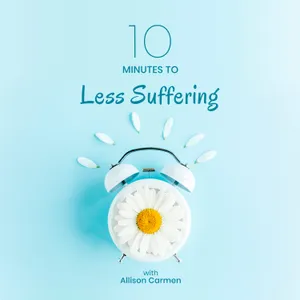Podcast Summary
Discovering hidden depths in personal relationships: Our closest relationships can have broader impacts than we realize, inspiring us to explore their legacies and broaden our perspectives.
Personal connections to the past can reveal hidden depths and significant contributions to the world. Jada Yuan's experience of discovering her grandmother, Chien Sheng Wu's, life after her death as a renowned nuclear physicist shows that our closest relationships can have broader impacts than we realize. The BBC, as a source of information, allows us to explore such stories and broaden our perspectives. Jada's journey to understand her grandmother's legacy took months of research and discovery, revealing a life of groundbreaking scientific achievements. Her story reminds us that the people closest to us can have profound impacts on the world, and that it's never too late to learn more about their lives and legacies.
A Pioneering Nuclear Physicist's Journey from a Fishing Village to Academia: Dr. Tien Sheng Wu defied societal norms to become a nuclear physicist, inspiring girls and women in science despite being born in a fishing village where education for girls was not prioritized.
Jada's grandmother, Dr. Tien Sheng Wu, defied societal norms to become a pioneering nuclear physicist despite being born in a fishing village during a time when girls were not prioritized for education. Her family, who founded a school for girls in her hometown of Yuhua, recognized her exceptional intellect and sent her to a boarding school to continue her education. Dr. Wu's thirst for knowledge led her to discover physics, and she went on to receive a scholarship to become a teacher. Her achievements were celebrated with grand events, including the unveiling of a massive mint-green statue in her honor. Even though she passed away before Jada was born, Jada has spent years piecing together her grandmother's story and cherishing her legacy as a role model for women and girls in science. The US Postal Service honored her with a forever stamp in 2021, immortalizing her image and her contributions to science.
A life driven by fear and uncertainty: Born during political turmoil, Hsien Sheng Wu found solace in physics, escaping uncertainty through education and research.
Hsien Sheng Wu's passion for physics was fueled by the instability and uncertainty in her life. Born in China during a time of political and social upheaval, she studied physics and mathematics in secret, driven by the fear that her education might be her only escape from the turmoil around her. When she was forced to leave her family and country to pursue her education in America, she threw herself into her studies, determined to succeed. The bombing of China by the Japanese and the subsequent Cultural Revolution only deepened her commitment, as she worked long hours in the lab and focused on her research on beta decay. Through her studies, she found solace and stability in the unchanging laws of physics, even as the world around her continued to crumble. After completing her PhD at the University of California, Berkeley, she married a fellow student and moved to the East Coast, where she briefly taught at Princeton. But her world was turned upside down once again when she received a call from Columbia University, leading her to a new chapter in her life. Throughout it all, Hsien Sheng Wu's determination and passion for physics carried her through the most difficult of times.
Grandmother's Top-Secret Physics Project Revealed: Doctor Wu's intuition identified Manhattan Project as nuclear research, she challenged established physics theories at Columbia University, and her discovery changed the understanding of the weak force
Doctor Wu, Jada's grandmother, was a brilliant physicist who kept her work on a top-secret project, later revealed to be part of the Manhattan Project, under wraps. During her interview, she was shown equations related to the project and, based on her knowledge and intuition, identified it as nuclear research. Decades later, she advised against nuclear weapon development during a visit to Taiwan. At Columbia University in 1956, she conducted groundbreaking experiments that challenged established theories in physics, ultimately changing the field with her discovery that phenomena in their mirror images were not always identical. This theory, which went against the prevailing scientific understanding, would revolutionize the understanding of the weak force, shattering a fundamental law of the universe.
Achievements and personal experiences shaped Doctor Qin Shi Wu's life: Doctor Qin Shi Wu, the first tenured woman in physics at Columbia University, made groundbreaking scientific achievements, but her personal experiences, including her relationship with her granddaughter Jada, were equally significant. She received numerous accolades and her apartment served as a sanctuary for her family.
Doctor Qin Shi Wu's life was marked by groundbreaking achievements in science, yet her personal experiences, particularly her relationship with her granddaughter Jada, were equally significant. The shattering of the parity barrier in science, as evidenced by her collaborators winning the Nobel Prize, was a historic event that impacted Wu's life. Her supportive husband and good childcare were essential to her success as the first tenured woman in the physics department at Columbia University. She received numerous accolades, including 16 honorary doctorates, the National Medal of Science, and the presidency of the American Physical Society. Her apartment, filled with Chinese culture and warm memories, served as a sanctuary for Jada. Despite passing away, Jada continues to seek a connection with her grandmother, recalling the comforting smells, scroll paintings, and ornate furniture of her grandmother's home.
The Power of Personal Stories in Connecting to Our Past: Personal stories have the power to deepen our understanding of our past and help us connect with our family history. Writing about these stories can bring us closer to our loved ones and inspire us to preserve and share them with future generations.
Learning from this conversation between Jada Yuen and Emily Kuang is the profound impact of personal stories in connecting us to our past and shaping our identities. Jada's piece about her grandmother, a physicist who lost her family and home during World War II, allowed her to engage in meaningful conversations with family members and gain a deeper understanding of her grandmother's experiences. The process of writing the piece brought Jada closer to her grandmother's story, and the longing for answers to unasked questions fueled her determination to bring her grandmother's history to light. This conversation serves as a reminder of the importance of preserving and sharing personal stories, as they provide valuable insights into our own histories and help us connect with the people and experiences that have shaped us.
Learning from Larry Fink of BlackRock: Investors face challenges in retirement, need long-term planning, adapt to market conditions, and prioritize sustainability. Stay informed and proactive to navigate complex investment landscape.
Learning from the latest episode of The Bid featuring Larry Fink, the chairman and CEO of BlackRock, is that investors are facing significant challenges, particularly in areas like retirement. Fink discussed how global capital markets can play a role in finding solutions to these issues. He emphasized the importance of long-term planning and the need for investors to adapt to changing market conditions. Fink also touched on the importance of sustainability and the role it plays in investing. By listening to the episode and subscribing to BlackRock's market insights, investors can gain valuable knowledge and insights from one of the world's leading financial institutions. Overall, Fink's message underscores the importance of staying informed and proactive in today's complex investment landscape.





